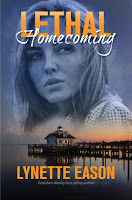by Dan Walsh
There’s a piece of writing advice beginners are sometimes told: “
Write what you know.” I get why. Fiction writing is all about making stuff up. If you write about things you know well, it’s much easier to sound credible and authentic as your story unfolds (as you make stuff up).
I heard this advice back in the days when I was crafting my first novel. I knew a whole lot about WW2, had been studying this era as a hobby for many years. So I set my first 2 novels (
The Unfinished Gift and
The Homecoming) on the homefront during WW2. Worked out great.

But in time, 2 things began to surface that revealed some flaws in this “write what you know” idea. If you plan to keep writing books, you eventually run out of things you know. Or you find, you don’t want to keep writing about the same thing over and over again (the thing you know).
Something I’ve learned to help offset this problem is to start paying attention to the things going on in my life that might actually—with some help—become decent material for my books. I added “with some help” because, let’s face it, my life, as is, would bore the average reader to tears. That is, taken as a whole. But if I spend some time breaking it down a bit, I realize my life does have some non-boring, interesting parts. Occasionally, even some exciting, adventurous parts. Admittedly, they are few and far between. But they do exist. And they are mine. I can use them in my books and don’t even need to get anyone’s permission.

Here’s an example. My wife is an amazing dog trainer (she’s professionally certified and has trained over 1,000 dogs). For 4 years, she was the Animal Behavior Manager at our local Humane Society and now trains dogs in a private practice. Every day she would come home with these fascinating stories. It dawned on me, I could do a series that featured a rescue shelter dog as a main character, as well as a dog trainer similar to her (only younger and single, so I could add a romantic thread). I’ve borrowed bits and pieces from some of her best stories to create at least 3 very good novel ideas (maybe more).
Just like that, and the Forever Home series was born.
Rescuing Finley (Book 1) came out last November and is doing extremely well (276 Amazon reviews, Avg 4.8 Stars). I just released Book 2,
Finding Riley, on October 1st. And here’s another fun way I helped Art to imitate Life…the dog on the cover of Book 2 (who’s playing Riley) is actually Charlie, a mixed spaniel dog we brought home from the shelter 2 years ago. I was able to use all kinds of things drawn from real-life experiences with Charlie in my new novel.
I just weave all this real-life stuff in with the made up stuff (which is often way more exciting) and it seems to be working out great (17 novels later).
Here’s my final example. We live in Daytona Beach. Two weeks ago, Hurricane Matthew came barreling through the Caribbean straight for us. It had been 12 years since we’d experienced a hurricane. Back in 2004, we went through 3 of them (and we didn’t evacuate; we stayed home). But the folks on the Weather Channel, and our local weather experts, were all saying this storm might hit us head-on as a strong Category 4. They were warning about massive tidal surges, roofs tearing off of houses, trees coming down all over.
Suddenly, we were told we had to evacuate…only 2 hours before the weather outside would start getting really bad. We rushed around the house, gathering insurance papers and things that mattered most into bags and suitcases, packed up the dogs, and joined a caravan of family members out on the highway (along with hundreds of thousands of others).
We drove nine hours straight toward Atlanta, wondering if we’d even have a home to come back to. The next few days provided quite an adventure.
At one point, my wife looked over at me, smiled and said, “I think Jack and Rachel will have to go through a hurricane.” I said, “Oh yeah. They definitely will.”
Who are Jack and Rachel? They are the main characters in my other novel series, The Jack Turner Suspense series. Jack and Rachel don’t know it yet, but their future now includes a number of crazy hurricane experiences that will remarkably resemble our own.
How about you? Share some of the moments when your Art has Imitated your Life in your writing.
TWEETABLES
* * *
 Dan Walsh is the bestselling author of 17 novels, including The Unfinished Gift, The Reunion and When Night Comes.
He has won 3 Carol Awards (finalist 6 times) and 3 Selah Awards. Three
of his books were finalists for Inspirational Book of the Year (RT Book
Reviews). Dan is a member of ACFW and Word Weavers. He lives with his
wife, Cindi, in the Daytona Beach area where they love to take walks and
spend time with their grandkids. Click here to connect with Dan or check out his books.
Dan Walsh is the bestselling author of 17 novels, including The Unfinished Gift, The Reunion and When Night Comes.
He has won 3 Carol Awards (finalist 6 times) and 3 Selah Awards. Three
of his books were finalists for Inspirational Book of the Year (RT Book
Reviews). Dan is a member of ACFW and Word Weavers. He lives with his
wife, Cindi, in the Daytona Beach area where they love to take walks and
spend time with their grandkids. Click here to connect with Dan or check out his books.
































